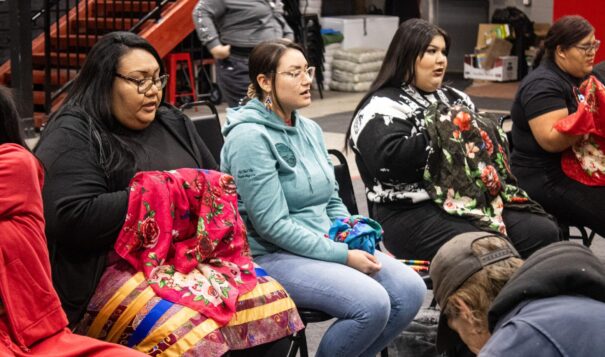News Based on facts, either observed and verified directly by the reporter, or reported and verified from knowledgeable sources.
Keeping hearts and minds healthy during the winter
 A women's team helps a new player learn how to play hand games during a tournament hosted by the Oyate Health Center on Friday, January 19, 2024, in Rapid City, South Dakota. (Photo by Amelia Schafer, ICT/Rapid City Journal)
A women's team helps a new player learn how to play hand games during a tournament hosted by the Oyate Health Center on Friday, January 19, 2024, in Rapid City, South Dakota. (Photo by Amelia Schafer, ICT/Rapid City Journal)
Oyate Health Center plans hand games night and round dance to bring community together
With colder temperatures keeping people inside, representatives from the Oyate Health Center looked for options to keep the Indigenous community connected and engaged.
Every month, representatives from the center’s Connecting With Our Youth Program hold a family friendly event to combat seasonal depression and encourage sobriety.
“With the cold weather and less social interaction, there’s a lot more isolation and depression within our community,” said Tiana Spotted Thunder, Oglala Lakota and the Connecting With Our Youth program coordinator. “Each month we gather and brainstorm different activities. We learn from what went well in the past and vote on events for the future.”
The program hosted a hand games night on Friday, January 19. From 6 to 10 p.m., the Oaye Luta Okolakiciye building was filled with singing, drumming and laughter.
Hand games or stick games have been played in various Indigenous communities for as long as anyone can remember. It’s a guessing game where two teams sit across from each other and hide a set of decorated bones.
Each team has a chance to hide a pair of small bones, one striped and one not striped. In Lakota-style hand games, the guesser tries to guess which hand is holding the striped bone. Every time the guesser is incorrect, their team gives a stick to the opposing team. At the end, whoever has the most sticks wins.
On top of the responsibility of guessing which hand holds the striped bone, traditional songs are sung to distract the opposing team. Spotted Thunder herself sang as the women’s team worked to distract the men’s team. During the next turn, a man from the men’s team played a hand drum and sang to distract the women.

Throughout the night, dozens of community members of all ages came together to play. Some were completely new to hand games and some were well experienced.
“We encourage people to come out and start with some type of cultural activity to help support them on their recovery journey,” Spotted Thunder said. “You will find solace in becoming sober and going to cultural activities. This is where you can start building your sober family.”
Another successful event from last winter was Connecting With Our Youth Program’s first round dance. Round dances, which are commonly seen in Canada, are a way to bring communities together during the winter months. During a round dance, community members drum and sing and share songs of love, loss and humor.
On February 10 at 6 p.m., the Connecting With Our Youth Program will be hosting its second annual “Cante Skya” (which means sweetheart in Lakota) Round Dance at the Holiday Inn Rushmore Plaza Ballroom. Award-winning Cree-Salish singer Fawn Wood will be performing, as well as Opie Day and Baby Opie.
“Our first event last year blew me out of the water, we had such a high number of attendees and we anticipate more this year,” Spotted Thunder said. “There’s so much cultural significance, not to mention the significance of combating mental health issues. That healing is what we wanted out of the round dance last year and we’ve seen some really great results.”
Spotted Thunder said a lot of research was put into how to bring a round dance to Rapid City. While round dances originated among the Plains Cree people of Canada, they’ve slowly made their way to America and have become popular in various Indigenous communities.
“I’ve been going to round dances since I was a teenager and I can’t remember any in South Dakota,” Spotted Thunder said. “For years, I’ve been asking a lot of questions like, ‘Why do we have round dances? What’s the background story behind round dance? What does this do for the people? How do you go about making one happen in your community?’ I’ve had a lot of guidance and been told a lot of stories and good advice on how to make one happen.”
Dateline:
RAPID CITY, S.D.
